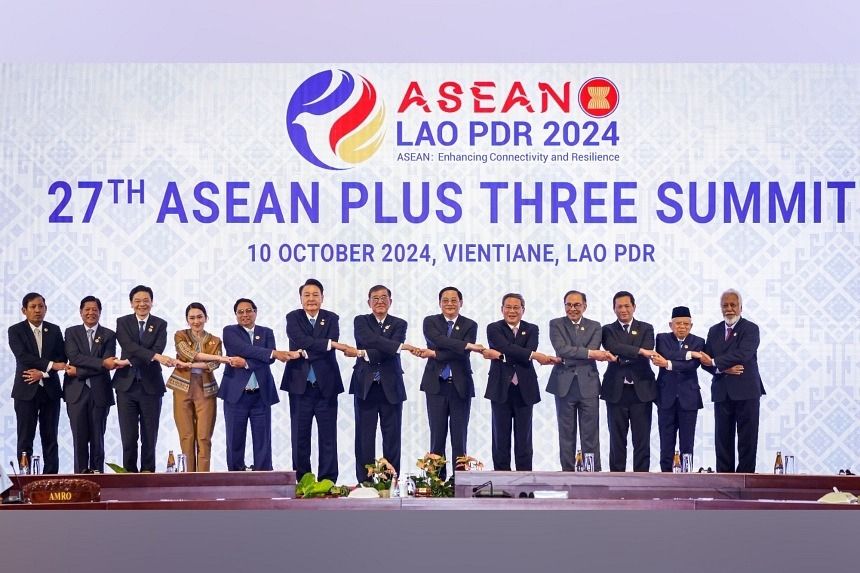
Singapore PM Lawrence Wong (third from left) with fellow Asean leaders, as well as South Korean President Yoon Suk-yeol (sixth from left), Japan PM Shigeru Ishiba (centre) and Chinese PM Li Qiang (fifth from right), at the Asean Plus Three summit in Vientiane on Oct 10. - PHOTO: LIANHE ZAOBAO / The Straits Times-ANN
VIENTIANE, Laos (The Straits Times/ANN): Asean deepened its relationships with several key partners on the second day of its annual gathering, in what Singapore Prime Minister Lawrence Wong said was a signal of the grouping’s commitment to free trade and staying open at a time of growing protectionism.
On Oct 10, leaders of the 10-member Asean took steps towards concluding an upgraded free trade pact with China, bolstered its ties with South Korea, and also urged Japan to update its economic agreement with the grouping, in a series of multilateral meetings held in Vientiane, Laos.
Addressing fellow Asean leaders as well as counterparts from China, Japan and South Korea during the Asean Plus Three (APT) summit, PM Wong said that the APT platform provided a strong foundation for the continued peace, stability and prosperity of the wider region.
Still, more can be done to bolster cooperation in areas including supply chain connectivity, as well as in the digital and green economies, said PM Wong.
“By promoting tangible cooperation in these areas and more, the APT can provide Asean with a strong anchor, and help us to develop a more open, inclusive and vibrant East Asia region.”
PM Wong also called on China, Japan and South Korea to collaborate with Asean on the digital and green energy fronts, mainly through the Digital Economy Framework Agreement that is set to be finalised in 2025, and to help develop infrastructure and norms for cross-border trading of renewable energy.
Touching on the importance of strengthening supply chain connectivity, PM Wong said the Covid-19 crisis had exposed vulnerabilities in this area and underscored the need for economies to remain connected and resilient by keeping supply chains open amid the increasingly uncertain global environment.
PM Wong also warned of further crises in the future, which is why Asean and its partners should work on building collective resilience to future shocks.
On the economic front, Asean and China also reached a milestone in negotiations to upgrade an existing free trade agreement that, when implemented, will ease supply chain disruptions, as well as cover emerging areas such as the digital and green economies.
This is the second time that the Asean-China Free Trade Area (ACFTA) is being refreshed since its inception in 2010, and the upgrade will allow nations to tap into future growth areas.
“It has facilitated the trade between our countries, and we have been each other’s top trading partner since 2020. So, it is significant that we are further improving on the ACFTA,” said PM Wong, referring to Asean’s trade with China.
Taking stock of the development of mutual economic growth enjoyed by China and Asean over the years, Chinese Premier Li Qiang said the upgrade was a significant step in economic integration.
“China hopes to explore with Asean more ways and means to connect and share our markets, (to) generate stronger, more lasting development impetus for both sides and provide more solid support for the shared prosperity of the region and the world at large,” he said.
Meanwhile, Asean and South Korea boosted ties by upgrading their dialogue relations to that of a Comprehensive Strategic Partnership (CSP).
Both parties also signalled their intention to enhance the existing Asean-Korea Free Trade Area.
The CSP is the highest level of partnership between Asean and its dialogue partners.
Before this, Asean had only established CSPs with Australia, China, India, Japan and the US, with that being considered the highest level of bilateral ties between Asean and its dialogue partners.
Across the board, Asean leaders also acknowledged the significant contributions its external partner nations have made to the region, including in areas of stability and prosperity.
With Singapore as the country coordinator of Asean-Japan relations, PM Wong represented the grouping during the Asean-Japan Summit to affirm Tokyo’s active role in areas like regional security and cyber security.
He suggested that they take the relationship further by enhancing people-to-people links and upgrading the Asean-Japan Comprehensive Economic Partnership Agreement (AJCEP) to reflect the growing importance of supply chain resilience, and the digital and green economies.
PM Wong also cited the digital domain and the development of safe and secure artificial intelligence as new areas for Asean-Japan collaboration.
“Our joint efforts should enhance our shared goals of a stable, open and inclusive regional order,” he said.
Japanese Prime Minister Shigeru Ishiba, whose participation in the Asean Summits marked his first overseas trip since assuming office earlier in October, stressed the need to forge closer ties with Asean.
“The security environment in the region is becoming increasingly severe. Any unilateral attempt to change the status quo by force or coercion is unacceptable anywhere in the world,” he said.
While addressing the Asean-India Summit, where leaders agreed to advance cooperation on trade, digital transformation and other areas of shared interest, PM Wong said that this relationship had come a long way since formal relations were established in 1992.
“Our relations are anchored in mutual respect and mutually beneficial cooperation,” he said.
Speaking at several summits throughout the day, PM Wong repeatedly encouraged fellow leaders to leverage their shared objectives and the Asean-centred platforms that brought these nations to the same table.
While attending the Asean-Australia Summit, he also noted that all parties present shared a vision of a rules-based, open and inclusive regional order that upholds international law.
“This is crucial in ensuring continued peace and stability in the region, especially amidst rising geopolitical competition and tensions,” he added.
And he highlighted Australia’s “consistent” support for the Asean Outlook on the Indo-Pacific (AOIP), which lays out Asean’s common position on regional cooperation, security and prosperity, as well as its stance on not taking sides with any major power competing for influence in the region.
“We should double down on tangible cooperation under the AOIP. And that means pursuing projects not only with each other, but also with our partners, especially in the East Asia Summit,” he said.
The East Asia Summit, which was established in Asean in 2005, brings together Asean member states as well as its eight key partners, Australia, China, India, Japan, New Zealand, South Korea, Russia and the US.
It will be held on Oct 11. - The Straits Times/ANN










































